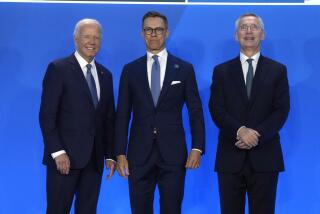6 Ex-Soviet Nations Plan to Share Air Defenses : Military: Pact calls for pooled resources, space collaboration. Heads of state could scotch agreements.
- Share via
MOSCOW — Defense ministers of half a dozen former Soviet republics, trying to revive some parts of one of history’s greatest military machines, agreed Tuesday to pool resources and forge a common air and missile defense network.
The top military officials of the six countries, led by Russia’s Pavel S. Grachev, also voted to collaborate to monitor outer space and draw up a long-term concept of joint armed forces.
Also meeting in Moscow, the foreign ministers of the Commonwealth of Independent States approved eight documents to be submitted to the U.N. General Assembly committing them to coordinated efforts in combatting terrorism, drugs, pollution and the spread of weapons of mass destruction.
“This is a completely new initiative,” Russian Foreign Minister Andrei V. Kozyrev told reporters. “At last we are dealing with the day-to-day problems of our citizens. . . . (It will mean) protection of human rights, support for victims of armed conflicts and help for refugees.”
The ability to agree on concerted action, Kozyrev said, shows that the Commonwealth, formed on the ruins of the Soviet Union, is not dying or dead as its critics claim.
“There is a growing tendency (in the former Soviet republics) to a more businesslike, realistic approach, to more mutual understanding that is founded on concrete documents,” he said.
All ministerial decisions, however, are subject to approval by the heads of state of the countries concerned, and many grand plans have been stillborn in the past. The next Commonwealth summit is scheduled for Sept. 7 in Moscow.
“If they have agreed on something this time, then that would really be a first,” one Moscow-based military attache commented about the defense ministers’ doings. “In the past, they mostly agreed to agree on something later.”
In fact, the defense ministers themselves provided a spectacle of how powerless Commonwealth institutions can be. Commonwealth joint military command was abolished in June. On Tuesday, the Defense Ministers Council decided to replace it with a working body under their control. But the ministers couldn’t agree to formally remove the Commonwealth commander in chief, Air Marshal Yevgeny I. Shaposhnikov.
The Kazakh delegation said it didn’t have a mandate for such a step.
The air defense agreement was approved not by all Commonwealth members but only by those six--Russia, Armenia, Uzbekistan, Kazakhstan, Kyrgyzstan and Tajikistan--who signed a collective security pact in Tashkent, Uzbekistan, on May 15, 1992.
The Soviet air defense and missile early-warning networks had boasted radar and monitoring stations in all 15 republics, including many installations on the fringes of the Soviet Union. Therefore, when the Baltic, Caucasus and Central Asia republics became independent, Russian air defense in many sectors effectively was blinded.
The disarray was highlighted a few days ago when, according to the Itar-Tass news agency, Russian interceptors forced a South Korean plane to land in the Russian Far East.
It turned out that the passengers, a married couple, had received a license to fly into Russian airspace from civilian authorities, but due to some administrative glitch no one alerted the military.
Russia also managed to persuade other signatories of the collective security pact to endorse the idea of fielding “coalition forces” under a single command along the troubled Afghan-Tajik frontier, with the exact arrangement to be decided later.
Grachev stressed that Russia will not be sending additional troops, so it seemed likely that his government, prey to economic and political crisis at home, was searching for a way to better share the burden.
More to Read
Sign up for Essential California
The most important California stories and recommendations in your inbox every morning.
You may occasionally receive promotional content from the Los Angeles Times.










